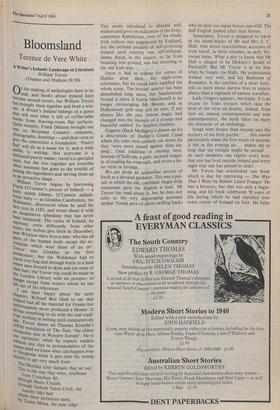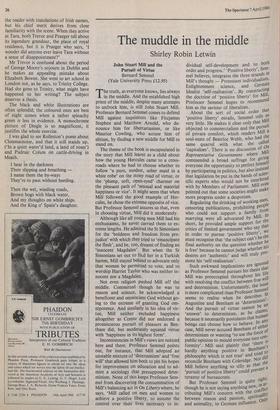Bloomsland
Terence de Vere White
A Writer's Ireland: Landscape in Literature William Trevor (Thames and Hudson £9.50)
Of the making of anthologies there is no end, and books about Ireland have become annual events, but William Trevor has brought them together and bred a win- ner. A Writer's Ireland belongs to a genre that will oust what is left of coffee-table books from drawing-room flat surfaces. Quite recently, Frank Delaney brought out one on Betjeman Country comment, Photographs, drawings — and then verse to give the concoction a foundation. 'Poetry flail' will do as a name for it, and a wide Public is waiting. Not everyone is a dedicated poetry reader; travel is a specialist taste, but the two together are irrestible When someone has gone to the trouble of Mixing the ingredients and serving them up in an attractive shape. William Trevor begins by borrowing Frank O'Connor's picture of Ireland — a Some baby — as Giraldus Cambrensis, the Welshman, discovered when he paid his first visit in 1183, and wrote about it with bimaginative splendour that has never en surpassed. The cocks of Ireland, he reported, crow differently from other Cocks; the wolves give birth in December; near Wicklow there lives a man 'who has all Parts of the human body except the ex- tremities which were those of an ox'. Trevor sees Giraldus as his first predecessor, but the Welshman had to travel over bog and through forest in a land Where men dressed in skins and cut none of their hair; the Trevor trip could be made in t,he London Library with no prospect of ?anger except refrom writers whom he has left out of his fe rences. I am least happy about the early c,napters. Richard Best liked to say that Ireland had all the material for Homer but unfortunately never produced a Homer. It all has something to do with the oral trach- ;Ion; nothing in writing until comparatively 1,a.te- Trevor draws on Thomas Kinsella's Withotootranslation of The Tain, 'the oldest acular epic in Western Europe'. He is optimistic when he expects readers _without any clue to pronunciation of the ut (and we know what can happen even mohogheda when it gets into the wrong th) to get very much from The Mondayafter Samain they set out. is is the way they went, southeast from Cruachan Ai;
e marshthrough Terloch TeOra Crich, the marshy lake bed
where three territories meet, by Tuairn Mona, the peat ridge ...
This seems calculated to alienate well- wishers and gives no indication of the lively, sometimes Rabelaisian, tone of the whole. Irish culture was suppressed by England, but the extreme prudery of self-governing Ireland until recently was self-inflicted. James Joyce, in this respect, so far from breaking new ground, was but returning to the old Irish way. Joyce is laid to tribute for scenes of Dublin after dark, his night-town references, but he could have supplied the whole scene. The brothel quarter has been demolished long since, but Sandymount Strand is there if Gertie MacDowelt is no longer encouraging Mr Bloom; and at Dollymount girls may still be seen, if not always like the one 'whom magic had changed into the likeness of a strange and beautiful seabird' for Stephen Dedalus.
Gogarty (Buck Mulligan) is drawn on for a description of Dublin's Grand Canal where the trees were unfairly cut down for they 'were more sinned against than sin- ning'. Oral tradition is missing here. Seumas O'Sullivan, a poet, accused Gogar- ty of stealing his wisecrack, and wrote a bit- ter verse in revenge. We are given an unfamiliar picture of Swift as a devoted gardener. This was a pur- suit in which the old, confident Anglo-Irish sometimes gave the English a lead. Mr Trevor has read about it, but he does not refer to the very disparaging accounts Arthur Young gave of claret-swilling bucks who let their too many horses run wild. The dull English looked after their horses.
Sometimes, Trevor is prepared to travel in the wheel-marks of Mr and Mrs S. C. Hall, who wrote conscientious accounts of Irish travel, in three volumes, in early Vic- torian times. What a pity to know that Mr Hall is alleged to be Dickens's model of Pecksniff. But Mr Trevor is at his best when he forgets the Halls. He understands Ireland very well, and his Ballroom of Romance, in the confines of a short story, tells us more about narrow lives in remote places than a regiment of earnest travellers.
Lady Gregory appears, inevitably. It is an excuse for Yeats extracts which raise the level of the verse on display. Indeed, from here on, among contemporaries and near contemporaries, the book takes on more the character of an anthology.
Synge went deeper than anyone into the mystery of the Irish psyche: '.. . this season particularly when the first touch of autumn is felt in the evening air... makes me so long that the twilight might be eternal ... At such moments one regrets every hour that one has lived outside Ireland And every night that one has passed in cities'.
Mr Trevor has overlooked one book which is due for reprinting — The Way That I Went by Robert Lloyd Praeger. He was a botanist, but that was only a begin- ning, and his book celebrated 70 years of life during which he had travelled over every corner of Ireland on foot. He helps
the reader with translations of Irish names, but his chief merit derives from close familiarity with the scene. When they arrive at Tara, both Trevor and Praeger tell about its legendary grandeur, the place of royal residence, but it is Praeger who says, 'I wonder did anyone ever leave Tara without a sense of disappointment?'
Mr Trevor is confused about the period of George Moore's sojourn in Dublin and he makes an appealing mistake about Elizabeth Bowen. She went to art school in London not, as he says, to Trinity College. Had she gone to Trinity, what might have happened to her writing? The subject deserves a thesis.
The black and white illustrations are often splendid; the coloured ones are best of night scenes when a rather spinachy green is less in evidence. A monochrome picture of Dingle is so magnificent, it justifies the whole exercise.
I was glad to see Rolleston's poem about Clonmacnoise, and that it still stands up. ('In a quiet water'd land, a land of roses') and Padraic Colum on cattle-driving in Meath.
I hear in the darkness Their slipping and breathing I name them the by-ways They're to pass without heeding.
Then the wet, winding roads, Brown bogs with black water, And my thoughts on white ships And the King o' Spain's daughter.











































 Previous page
Previous page